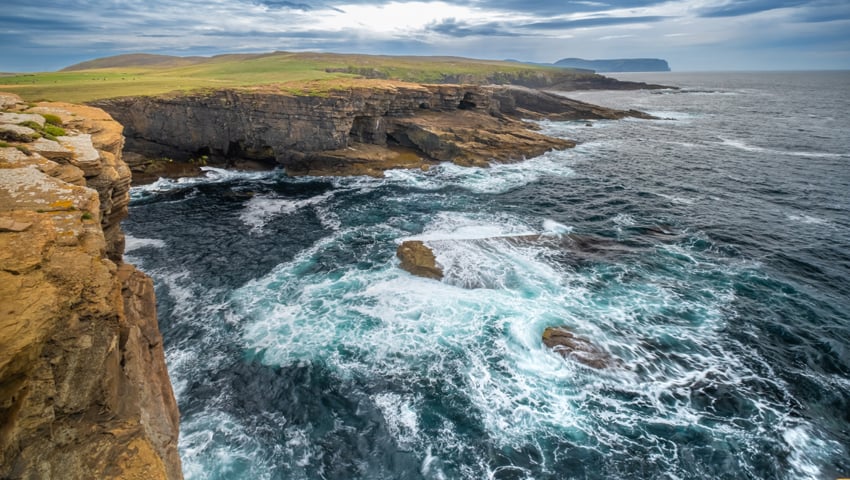Plans to protect the wildlife of the Orkney Islands from a man-made threat have been given a significant boost today as the Orkney Native Wildlife Project prepares to bring together the funding needed to begin the final phase of work.
The wildlife of the Orkney Islands is internationally important, with visitors from around the world drawn to the haven for rare seabirds, waders, and hen harriers, along with the Orkney vole that exists nowhere else on the planet. However, the wildlife in this unique and delicate environment is under threat due to stoats that were brought to Orkney intentionally or unintentionally by people.
Stoats are not native to Orkney, and can only have reached the islands by boat, since the first sighting in 2010 the population quickly grew to thousands becoming a major threat to the native wildlife by eating eggs and smaller creatures.
The National Lottery Heritage Fund has announced its continued support by awarding £2.5m in additional funding. Alongside this, the Nature Restoration Fund, managed by NatureScot, has granted an additional £1.5m in what is the largest project of its kind in the northern hemisphere, and the only one on an inhabited island archipelago.
In 2019 work began on removing the stoats from the islands bringing together local people, landowners, the RSPB, Orkney Islands Council and Scottish Government and the expertise of international specialists.
Acting Net Zero Secretary Gillian Martin said, “Nature in Scotland is in decline and if we don’t take urgent action, that will continue and important species will be lost forever. The Nature Restoration Fund is a key delivery mechanism for our nature-positive, net zero ambitions. That is why we have invested £65 million through the Fund to support projects that are helping to protect and restore our natural environment.
“This commitment of £1.5 million from the Nature Restoration Fund will help to support the vital work that the Orkney Native Wildlife Project is doing to save the islands’ precious native wildlife.
“It will also help to secure green jobs and skills development, alongside the environmental benefits to communities in Orkney.”
Eilish McGuinness, chief executive of The National Lottery Heritage Fund, said, “The Heritage Fund is pleased to continue to support this important partnership and environmental project. It is vital for the future of Orkney’s internationally rare and threatened species, but is also of global significance in sharing best practice in tackling the threat from invasive species.”
The project is proving its worth, delivering results even with the interruptions caused by the global pandemic and lockdown. Thousands of stoats have been removed from the islands, creating a safer environment for the native wildlife. Helping wading birds such as the distinctive oystercatcher where 83 per cent of nests escaped predation, giving the next generation the best chance to survive, with similar successes for the curlew populations where over half of nests are now reaching hatching from just one in ten and the number of ground-nesting hen harriers has seen 160 young fledge compared to 60 before work began.
However, experts are warning that the project is now at a critical stage, where if the partnership is successful would ensure the Orkney Islands remain a stronghold for Scottish wildlife, rare waders and globally important for the world’s seabirds.
Anne McCall, director of RSPB Scotland said, “Today’s funding announcements from the National Lottery Heritage Lottery Fund and NatureScot come at a critical time as the partnership focus on what is needed to finish the job. The Orkney Islands are a special place, a haven for wildlife that is being pushed to the brink elsewhere in Scotland, the UK and, for some species, even globally.
“In just a few years, from the first sighting, stoats have had a devastating effect on the native wildlife of the islands, and this is a problem that humans have inadvertently created. However, through the hard work of everyone coming together; including the welcome support of local landowners and the backing of Orkney residents who have been working with our team of international experts we are on the brink of completing the world’s largest island stoat eradication project. And thanks to National Lottery players and the Nature Restoration Fund we now are a step closer to securing the investment needed to finish the job.”
NatureScot Chair, Professor Colin Galbraith said, “Invasive, non-native species are a major threat to our biodiversity, so it’s vital that we support efforts to protect Orkney’s internationally important wildlife. Thanks to the Nature Restoration Fund, we can do this, and we wish the project further success in their efforts to remove stoats from the island for good.”
With the goal of a stoat-free Orkney in sight the partnership is now looking at options to raise the additional funding needed to extend the project for five years and remove the final remaining stoats.
